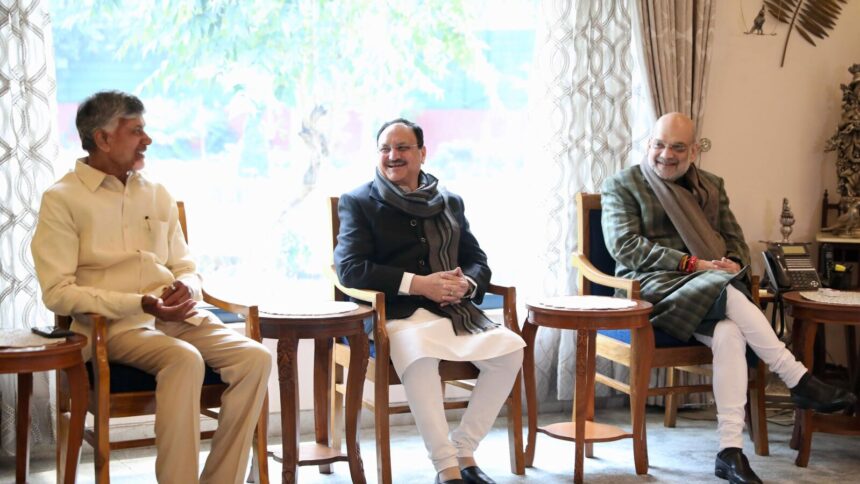The National Democratic Alliance Meeting: Reflections on Leadership, Governance, and Strategy
On December 25, a significant meeting of the National Democratic Alliance (NDA) was held at the residence of Bharatiya Janata Party (BJP) president JP Nadda in New Delhi, timed to coincide with the birth centenary of former Prime Minister Atal Bihari Vajpayee. This meeting brought together a range of leaders from across the NDA coalition, reflecting not only on Vajpayee’s legacy but also on the current political landscape and future strategies.
Key Leaders in Attendance
The meeting saw the presence of prominent NDA leaders, including:
- Amit Shah, Union Home Minister and senior BJP leader.
- Chandrababu Naidu, president of the Telugu Desam Party (TDP) and Andhra Pradesh Chief Minister.
- Rajiv Ranjan Singh, Union minister and leader of Janata Dal (United).
- Anupriya Patel, Union minister and president of Apna Dal (S).
- Additionally, leaders from regional parties such as Jitan Ram Manjhi, president of Hindustani Awam Morcha (S), and Thushar Vellappally, president of Bharath Dharma Jana Sena, were also in attendance.
The varied representation illustrated the alliance’s collective strength and reaffirmed its commitment to common goals.
Agenda Focus: Governance and Political Unity
While the specifics of the agenda were not officially disclosed, participants suggested that discussions centered around good governance and pressing political issues. One of the meeting’s key themes was the ongoing commitment to "good governance," a term often used to highlight transparency, accountability, and effective administration across various levels of government.
JP Nadda, in his address after the meeting, highlighted the NDA’s achievements under Prime Minister Narendra Modi’s leadership, claiming that India is rapidly advancing toward becoming a global superpower. He emphasized that the NDA remains focused on the vision of "Viksit Bharat@2047," which aims to ensure a prosperous and secure future for all citizens.
Uttar Pradesh’s Chief Minister Sanjay Nishad referred to this gathering as an "informal" meeting and mentioned an overarching need for unity among NDA constituents as they prepare for upcoming elections. He acknowledged the collective effort required to build a cohesive strategy, stressing the importance of collaboration to demonstrate electoral strength.
Addressing Controversies and Opposition
As with any political gathering, the meeting was not without its challenges. Reports indicated that the remarks made by Amit Shah regarding Dr. B.R. Ambedkar might have surfaced, although Nishad downplayed this, indicating the focus was rather on "people’s welfare." This reflects a broader strategy within the NDA to maintain a positive narrative amidst criticism from opposition parties, chiefly the Congress and other groups that may oppose the government’s stance or decisions.
Looking Ahead: Simultaneous Elections and Strategy
A noteworthy aspect of the NDA’s current focus is the proposal for simultaneous elections, which has garnered support from various alliance members. The formation of a Joint Committee of Parliament to examine two bills regarding simultaneous polls is set to convene on January 8. The concept of simultaneous elections is aimed at streamlining the electoral process and addressing the logistical challenges posed by staggered polling.
This strategic focus on simultaneous elections indicates a proactive approach, enabling the NDA to potentially maximize voter turnout and reinforce their governance narrative across states.
Conclusion
The NDA meeting on December 25 was not merely a commemoration of Atal Bihari Vajpayee’s influential legacy but a strategic reorientation for the alliance as it faces future electoral challenges. By focusing on good governance, establishing unity among party leaders, and embracing proactive politics, the NDA aims to solidify its position in the evolving Indian political landscape. With multiple elections on the horizon, the decisions made and the unity demonstrated could prove pivotal in shaping the country’s governance in the years to come.










